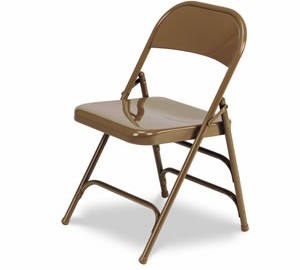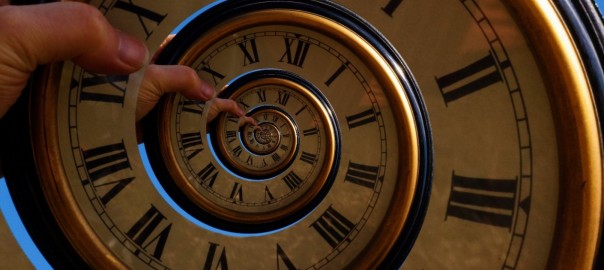The lunchroom was packed – all the long tables filled. With class lunch times staggered from 11:30 to 1:30, it would be at least two o’clock before the last table had emptied. Joe wondered how long he was going to have to stand like this. He’d been standing, balanced, since a few minutes before noon. It was now 12:15. His own class had finished and gone to recess. In another fifteen minutes they would be returning to their classroom.
A few minutes past 11:30, just after Joe and his classmates had found seats and begun eating, someone had shouted at Joe – something about what flavor Gerber’s baby food his mother had packed for him today. Joe was used to the taunts, he had been teased and bullied about his size and poor health ever since he started school, but nevertheless, this time, he shouted back to shut up. Just as he did, the school principal, Mr. Chaney, happened to walk by his table.
“Joseph, since when has the lunchroom become the place for shouting?”
“I was just…”
“I heard what you were doing, you were telling someone to shut up.”
“But they were…”
“Joseph, that’s enough. Get up, fold up your chair and come with me. Normally I would paddle someone shouting like you were and then trying to argue with me, but, as you know, I have notes from your mother and your doctor not to ever paddle you. So we must find other punishments.”
Hundreds of eyes followed Joe as Mr. Chaney led him to the main entrance of the lunchroom. “Come over here to the side, Joseph, we don’t want you blocking traffic. Now set up your chair.”
Joseph is staring at the school buildings. For a grade school it’s a fairly large campus – two buildings, three baseball diamonds, and a field for football and track. The main building has a tower in one corner, overlooking the ball fields. Joseph remembers that the ground floor of the tower had always been used to store sporting and groundskeeping equipment. He has no idea what the other floors hold, if anything, but he is going to find out. He needs to know for his plan to work. He walks toward the tower, casually, trying not to look around. There are two gym class softball games going on in the fields, but everyone there is concentrating on the games. There is no one else around.
The door to the tower isn’t locked. Joseph didn’t really expect it to be, but he is still relieved. He steps into the darkness and closes the door behind him. He is in a square room that takes up the entire ground floor of the tower. There are two small windows letting in light, and Joseph finds himself surrounded with lawnmowers, rakes, and other equipment he doesn’t recognize in the half-light. He winds his way through to the stairs in the back left-hand corner of the tower. The stairs are a familiar sight, they are exactly the same as the stairs in the school building – up eight steps and then the flight turns back on itself, up and up. There is a small landing and doorway at every floor. Joseph starts up the steps, hoping that access to the roof isn’t locked.
“Put it up right here,” Mr. Chaney said. “Now I want you to stand on it until I come to get you. Maybe then you’ll remember that there’s no shouting in school, not even in the lunchroom.”
“You want me to stand on a folding chair? What if it closes?”
“Just be careful and it won’t close. Stay balanced. I’ll come to get you when I think you’ve learned your lesson.”
“But I have to get back to class soon.”
“Joseph, what did I tell you about arguing with me. Now get up on the chair.”
Joseph has climbed up to the fifth floor of the tower. He’s opened the door on the landing of each floor, but has seen no sign of any recent use by anyone. There are broken desks and old blackboards on the two lower floors, and crates of what he assumes are out of date school books and student records. But past the second floor there is nothing, just dust and cobwebs. Joseph looks up from the fifth floor landing and sees only two more short flights of stairs – sixteen more steps. The landing on the sixth floor is much like the others, the only difference is a metal ladder fixed to the wall leading up to a hatch. Joseph doesn’t see a lock, only a set of sliding bars controlled by a lever that held the hatch closed. The ladder is woven with spider webs. Joseph brushes them away as best he can and climbs the rungs. At the top he holds the ladder with one hand while he tries to pull the lever that moves the bars to open the hatch. At first the only budge a little, but Joseph switches hands and pulls harder. Dust and flecks of metal are falling down on him, but he finally gets the bar to slide, and the hatch falls open.
Once he was actually standing on the folding metal chair Joseph was afraid to move. He imagined a foot sliding backwards, just enough to put pressure on the back of the chair seat and cause it to close. He thought of the chair swallowing him, a brown metal lunchroom monster. “Look, we’ve got a floor show,” he heard someone say. He couldn’t tell who said it, but there was a round of laughter. He looked around for an instant, but then looked back down at his feet, assuring himself that they haven’t moved.
“Hey Joe, how’s the view from up there?” More laughter. “Do you want to get down? Do you want your mommy?”
Joseph risked another look out at the lunchroom. He didn’t recognize any individual faces, he saw only a sea of laughter. He spotted one or two teachers off to the side, standing, watching him. He thought he saw pity in their faces. He wondered if he was imagining it. Already his legs were getting stiff, and it had only been a few minutes.
“Are you going to cry, baby?”
Joseph climbs up the last rungs of the ladder and crawls out onto the roof of the tower. He stands in the morning sunshine and looks around. The softball games are still going on below him. The players are tiny, running for a ball too small to see. Joseph stares at them for a moment while they play a game that he has never been invited to play.
The lunchroom clock showed that only a half hour had passed since Joseph climbed up onto the chair. It was going on 12:30. His class was gone. Other classes had come in, filling his ears with more taunts and laughter. Girls pointed at him as they came into the lunchroom, already the whole school must know about him. Joseph’s right leg, the one pressing against the front part of the chair to hold it open was beginning to shake. Joseph wanted to switch them, but he wasn’t sure how to do it. He was afraid to move. He was afraid he was going to cry, though he knew that would only make things worse. Everybody coming in or leaving had to walk right by him. Everyone looked at him. Everyone laughed at him.
“Hey Joe…you know you look really stupid up there. Did you forget the way down?”
“Do you like it up there?”
Joseph takes a closer look around the roof of the tower. The roof is completely flat, there is no kind of wall around the edge. It is perfect for his message. He looks around again. One of the softball games is ending, the players heading into the showers. They would be replaced, Joseph knew, by a new class in a few minutes. He watches the students filing into the gym for a moment, then turns toward the school buildings. The playground between the buildings is empty, it’s still to early for recess. The teachers’ parking lot is filled with cars. Joseph doesn’t recognize most of them, but he does see Mr. Chaney’s car. Not the same car he drove back then, but Joseph had been watching, and he was sure it was Chaney’s car. Perfect. Two rows away he sees his own car. Turning, he goes back through the hatch into the tower.
Joseph was going to cry. He didn’t think he could stop it. His left leg was almost numb. He wished that he had gotten onto the chair facing the back, so he could hold onto the backrest, steady himself. Maybe lift one foot at a time and move his toes while he held to the back of the chair. But he knew that Mr. Chaney wouldn’t have allowed that. He wanted Joseph facing the lunch crowd. So Joseph stood, frozen in place. He had put his hands in his pockets, not knowing what else to do with them. It was a few minutes after one o’clock.
Joseph is back in the school parking lot, standing beside his car. He opens the door on the passenger side, pulls the lever that sends the front seat forward. The back seat is filled with trash, unpaid bills, unmailed resumes, old sandwich wrappers. Leaning against the seat is a large artist’s portfolio case, leather, zipped closed, with a handle. Unlike the car and everything else in it the case looks brand new. Joseph maneuvers it carefully out of the car. It seems fairly heavy. Once it’s out Joseph slams the door shut. His keys and wallet are lying on the front seat, but he doesn’t bother locking it. What difference can it make? Without looking back he starts back toward the tower, looking perhaps like a visiting art teacher.
Joseph couldn’t feel his legs. He thought his right leg was still shaking, but he couldn’t tell for sure. He no longer heard the other kids, no longer saw the lunchroom clock. He was locked in his own frozen world of terrified stillness. He wasn’t even sure he would ever be able to get down, even if he was allowed to. He hated the lunchroom. He hated the chair. Mr. Chaney. Especially Mr. Chaney. His mouth was completely dry. His eyes were wet.
Joseph’s ascent of the tower stairs goes much more slowly with his burden. He switches hands often, carrying it carefully to keep it from dragging or knocking against the wall. There is no one around, but still Joseph is terrified of making any noise. There is metal in the portfolio case. He doesn’t want it clanking together. Once up the last flight of stairs, it is even harder to maneuver the case up the ladder to the roof. The hatch was still open, as he had left it. With one arm hooked around the top rung of the ladder, Joseph finally manages to lift the case up and through the hatch. He pushes it slightly off to the side, then steps once again into the sunlight.
It is a few minutes before two o’clock. Joseph realizes that someone is talking to him. It takes him a moment, but he realizes that it’s Mr. Chaney. “Do you think this was a fair punishment, Joseph?” Joseph doesn’t answer. “Or do you think some of the people making fun of you should have had to take your place?” Again, Joseph doesn’t answer, but he does nod his head. He is thinking about how much he would like to see Mr. Chaney standing on the chair for five minutes. “I think you’ve learned your lesson, Joseph. You may get down now. Do you need help?”
Joseph shook his head no, but Mr. Chaney helped him anyway, sort of helping him slide down until he was sitting on the chair.
“Sit there for a few minutes, Joseph, and then get to class. I’ve told your teacher to let you in without a note. And no more shouting.”
Joseph unzips the portfolio case. Inside is something big and flat, wrapped in bubble wrap and tape. Joseph takes a small pocket knife from his pocket and starts cutting the tape. Occasionally there is a small pop from the bubble wrap. As he unwraps he lets the wind take the bubble wrap. He won’t be rewrapping anything. Finally the entire package is unwrapped. Inside is a brown metal lunchroom chair. It’s not really from the lunchroom, though. Joseph stole it during one of his short-lived janitor jobs, from cleaning up after a basement church meeting. Joseph unfolds the chair and sets it in one corner of the tower, just at the edge, looking down on the playground on one side and the parking lot on the other. In the playground children are just filing out for recess, some running, some bouncing balls for four-square or basketball. He watches the children for a moment, turns to be sure he can still see Chaney’s car in the lot, make sure he is still there, then he climbs up on the chair, feeling the familiar metal under his feet. He can feel the sun on his head as he starts rocking back and forth on the soles of his feet. He presses down on the back of the chair seat with his right heel and wonders which way he will fall.





